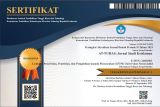Afifuddin, W., Noorthaibah, N., Julaiha, S., Suraijiah, S., Jannah, F., & Setiawan, A. (2021). The Establishment of Khilafah and the Distortion of the Meaning of Jihad Islamic Teaching: Views of Pesantren Kyai. Review of International Geographical Education, 11(5), Article 5.
Aji, D. K. (2017). Konflik Dalam Bingkai Sosial Keagamaan. Nizham Journal of Islamic Studies, 3(1), 28–35.
Amsori, & Ernawati. (2020, Mei 4). Khilafah Islamiah in International Islamic Political Perspective. Conjunction with the 3rd International Conference on Quran and Hadith Studies (ICONQUHAS). Proceedings of the 2nd International Colloquium on Interdisciplinary Islamic Studies (ICIIS), Eropa.
Arif, S. (2016). Kontradiksi Pandangan HTI atas Pancasila. Jurnal Keamanan Nasional, 2(1), 19–34.
Arifan, F. A. (2011). Pandangan Aktivis Hizbut Tahrir Indonesia (HTI) Di Malang Tentang Metode Ijtihad Hti Dalam Bidang Politik Dan Ibadah. Jurisdictie: Jurnal Hukum Dan Syariah, 0.
Aziz, A. (2019). Kontroversi Khilafah. LKIS.
Azmeh, W. (2016). Misconceptions About the Caliphate in Islam. Digest of Middle East Studies, 25(2), 227–263.
Azwar, W. (2018). The resistance of local wisdom towards radicalism: The study of the tarekat community of West Sumatra, Indonesia. Pertanika Journal of Social Sciences and Humanities, 26, 75–102.
Bachtiar, H. (2011). Mashlahah Dalam Formasi Teori Hukum Islam. Ulumuddin Journal of Islamic Legal Studies, 7(1).
Copleston, F. (2021). Filsafat Santo Thomas Aquinas. BASABASI.
Dijk, C. V. (1983). Darul Islam, Sebuah Pemberontakan. Grafiti Pers.
Dijk, T. A. van. (1997). Discourse as Social Interaction. SAGE.
Giddens, A. (1982). Hermeneutics and Social Theory. Dalam A. Giddens (Ed.), Profiles and Critiques in Social Theory (hlm. 1–17). Macmillan Education UK.
Ginting, R., & Aryaningrum, K. (2009). Toleransi dalam Masyarakat Plural. MAJALAH LONTAR, 23(4). https://doi.org/10.26877/ltr.v23i4.665
Hawari, M. (2005). Reideologi Islam: Membumikan Islam Sebagai Sistem. al-Azhar Press.
Hermawati, R., Paskarina, C., & Runiawati, N. (2017). Toleransi Antar Umat Beragama di Kota Bandung. Umbara, 1(2), Article 2.
Hidayatullah, Moch. S. (2018). Discourse War on NKRI versus Khilafah Issues in Indonesian Cyber Media. Education and Humanities Research (ASSEHR)dan Atlantis Press, Vol 154.
Hilmy, M. (2011a). “Akar-akar Transnasionalisme Islam Hizbut Tahrir Indonesia (HTI),.” Islamica: Jurnal Studi Keislaman No. 1, Vo.6, 3.
Hilmy, M. (2011b). Akar-akar transnasionalisme Islam Hizbut Tahrir Indonesia (HTI). Islamica: Jurnal Studi Keislaman, 6(1), 1–13.
Jauhari, M., Suryandaru, Y. S., & Sugihartati, R. (2021). Dialektika Khilafah dan Politik Kebangsaan dalam Media Publik Siber. Religious: Jurnal Studi Agama-Agama dan Lintas Budaya, 5(2), 199–216.
Mahon, D., Cowan, C., & McCarthy, M. (2006). The role of attitudes, subjective norm, perceived control and habit in the consumption of ready meals and takeaways in Great Britain. Food Quality and Preference, 17(6), 474–481.
Masduqi, I. (2013). Deradikalisasi Pendidikan Islam Berbasis Khazanah Pesantren. Jurnal Pendidikan Islam, 2(1), 1–20.
Miles, M. B., Huberman, A. M., & Saldana, J. (2014). Qualitative Data Analysis: A Methods Sourcebook. SAGE Publications.
Muazaroh, S. (2019). Pembubaran Hizbut Tahrir Indonesia Perspektif Maqashid: Otoritas atau Otoritarianisme. Justicia Islamica, 16(1), 103–120.
Qohar, A., & Hakiki, K. (2017). Eksistensi Gerakan Idiologi Transnasional HTI Sebelum dan Pasca Pembubaran. KALAM, 11, 365.
Rosyid, M. (2017). Peredam Konflik Agama: Studi Analisis Penyelesaian di Tolikara Papua 2015. Afkaruna: Indonesian Interdisciplinary Journal of Islamic Studies, 13(1), 48–81.
Rusfi, M. (2014). Validitas Maslahah Mursalah Sebagai Sumber Hukum. Al-’Adalah, 12(1), 63–74.
Setiawan, I. (2018). Islam dan Nasionalisme: Pandangan Pembaharu Pendidikan Islam Ahmad Dahlan dan Abdulwahab Khasbullah. Hayula: Indonesian Journal of Multidisciplinary Islamic Studies, 2(1), 1–16.
Thohir, U. (2020, Februari 4). The Enthusiasm of Nahdlatul Ulama and Muhammadiyah Ideology in the Perspective of Post-Modern Ethics. Proceedings of the 19th Annual International Conference on Islamic Studies, AICIS 2019, 1-4 October 2019, Jakarta, Indonesia.
Uswatusolihah, U., & Sangidun, S. (2018). Interaksi Sosial Muslimah Hizbut Tahrir Indonesia (MHTI) Pasca Pembubaran. Yinyang: Jurnal Studi Islam Gender Dan Anak, 13(2), 349–369.
Woodward, M., Yahya, M., Rohmaniyah, I., Coleman, Di. M., Amin, A., & Kundry, C. (2012). Hate Speech and the Indonesian Islamic Defenders Front | CSC Center for Strategic Communication (No 1203). ASU.
Indonesia, C. N. N. (2021, Januari 2). GP Ansor Jatim Terbuka bagi Eks FPI: Kita Lupakan Masa Lalu. nasional. https://www.cnnindonesia.com/nasional/20210102121708-20-588668/gp-ansor-jatim-terbuka-bagi-eks-fpi-kita-lupakan-masa-lalu
Media, S. U. (2019a, Juni 25). KH. Muhammad Yasin, PP Al Fattah Mumbulsari Jember, “Demokrasi Itu diputuskan dengan Suara Terbanyak, Bukan Terbenar.” Shautul Ulama Media | Seruan Ulama Aswaja. https://shautululama.co/kh-muhammad-yasin-pp-al-fattah-mumbulsari-jember-demokrasi-itu-diputuskan-dengan-suara-terbanyak-bukan-terbenar/
Media, S. U. (2019b, Juni 27). Liqa syawal pesantren bahrul ulum tanggul jember, “khilafah akan tegak dalam waktu yang sangat dekat dengan izin allah.” Shautul Ulama Media | Seruan Ulama Aswaja. https://shautululama.co/liqo-syawal-pesantren-bahrul-ulum-tanggul-jember-Khilafah-akan-tegak-dalam-waktu-yang-sangat-dekat-dengan-izin-allah/


 (STAI Cendekia Insani)
(STAI Cendekia Insani) 




.png)







